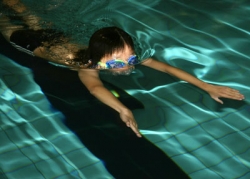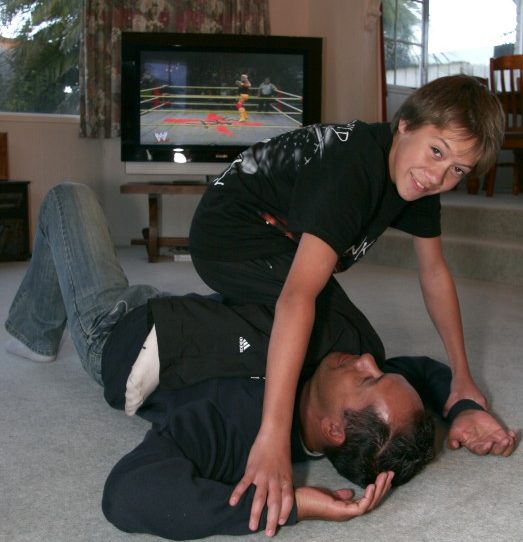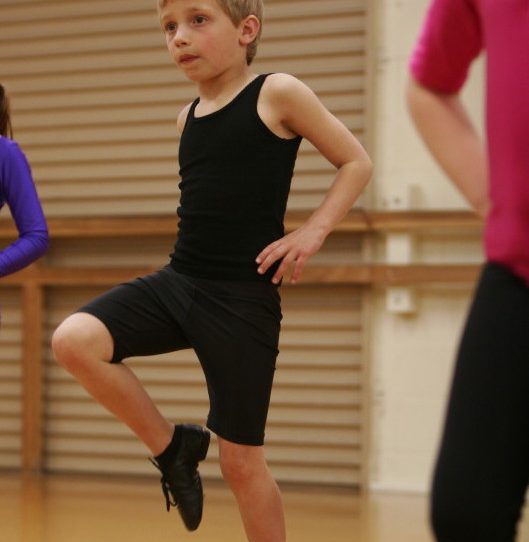Dad’s Corner: Speech is Golden

The ambition hit us last summer. I had convinced my son that by the end of summer vacation, he would be able to swim across the lake and back. We practiced nearly every day, each day going a bit farther. I estimate the distance across the lake and back to be about 700 to 800 meters. After about three weeks I thought we were ready.
“Today we’ll make it,” I predicted. Dusk had already set in when we got to the lake. We clapped our thighs, yelled “Off we go!” and waded into the water up to our chests. Confident of victory, we started swimming and made surprisingly good progress. Quickly we reached the middle of the lake.
“Great,” I yelled, “looking good!”
Fritz was trying hard to keep his head above the water – not because he was scared to get water into his face, but because he was talking. And not just a word or two now and then, but non-stop.
“Save your breath,” I warned him. “You’re going to need it.”
When we reached the other side of the lake and turned around, it dawned on me why we had moved forward so quickly. The wind had pushed us across the lake. Now it was blowing strongly against us. I was afraid that the way back would be much harder, but decided not to share this with Fritz.
Between the ages of 8 and 10, children are supposedly at the best age to acquire motor skills. So I thought it was important to work on Fritz’s technique: “Keep your fingers together. Reach forward with your arms. And straighten your legs. Try to lie straight in the water, parallel to the surface.” He tried hard while I was explaining why he should keep his fingers together. Think of a duck’s feet, I told him. “There’s no water getting through.” I couldn’t help but think of the water wings that helped me learn swimming when I was a kid. You know, those blow-up plastic things that make you look like Popeye with orange, green or blue biceps, or like a fat lady with beefy arms. No one can explain why they’re called “wings.” After all, what animal swims with wings?
“Did you know that you weigh much less in water than on land?” I asked my son. (A 155-pound person weighs less than 15 pounds in water.) I thought that might help him. But halfway through our return trip, I heard what I had feared hearing. “I can’t go any further,” said my son.
“Come on, you can do it,” I tried to encourage him. “Try to distract yourself.”
“But how?”
Good question. When you get tired while running or cycling, you can focus on markers along the way: you can work your way forward tree by tree or street light by street light. You set yourself little goals and fight forward bit by bit until you reach your ultimate goal. On an open lake, however, this is impossible – there are no street lights. So I said, “Think of something nice and tell me about it.”
Maybe it was the water that inspired him to talk about, of all things, “Pirates of the Caribbean.” I have never understood the fascination with this movie trilogy, but kids seem to love it. Now, in the middle of the lake, Fritz wondered why the movie was permitted only for kids 12 or older. “Nothing bad happens anyway,” he said. Sure, apart from dead people floating in the water, cannibals and bloodthirsty massacres, the film is completely harmless. So here we were, discussing the appropriateness of “Pirates of the Caribbean” for 9-year olds. While I was making sure that we stayed on the right track, as it had become nearly dark by then, Fritz was talking excitedly about the slightly sexually ambiguous Captain Jack Sparrow, alias Jonny Depp. I didn’t know what to say.
“I feel the ground!” he suddenly screamed. “We are there!”
I explained to him once again that it sometimes helps to distract yourself from a hard task so that you reach your goal without even noticing, and how our talking had helped him get through the toughest part of our swim. All in all, a good day’s work of fathering, I thought. Or at least I did until a few days later.
On that day, Fritz had forgotten his swimming gear for his school swimming class, so I had to bring it to the pool. I had some time to spare and decided to watch a few minutes of the class. I saw how the kids jumped into the water one after the other and began to swim. They all swam their laps in an orderly fashion – except for Fritz. He swam next to another boy, and was talking and talking. I suddenly remembered an old race report from “Runner’s World.” It described how a group of Kenyans in the lead pack of a road race unnerved their competitors by constantly talking to them. They chatted and chatted for miles, until all of the competitors were completely demoralized and fell off the pace. Perhaps, I thought, Fritz was developing a new strategy for swim races. Maybe, I thought, he would one day win the Olympic 1500-meter final simply by tiring out all the other competitors by non-stop talking. I already saw the headline: “Silence is silver, speech is golden!”
Then I heard the teacher yell: “Fritz, stop talking now!” My parental instincts kicked in immediately. This teacher was about to ruin my son’s Olympic career!
He should let Fritz talk, because that’s part of his training, I gently told the teacher.
He looked at me quizically. But because a good teacher recognizes and nurtures the individual strengths and weaknesses of his students, he seemed interested. What is Fritz training for, he wanted to know.
Like an ace student, I answered immediately: Aqua talking.
This article was written by Take The Magic Step™ team member Piet Könnicke, a writer for a newspaper in Potsdam, Germany and a lifelong runner.
- Posted August 28, 2007
© Copyright 2007-2024 by Take The Magic Step®. All Rights Reserved.




